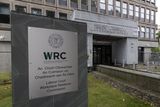Worst of energy bills ahead as ‘no end to crisis in sight’ – Eamon Ryan
Environment Minister Eamon Ryan. Photo: Oireachtas TV
THE worst is yet to come for electricity and gas customers with “no end in sight” to the forces driving bills sky-high, Energy Minister Eamon Ryan has warned.
Mr Ryan said there was “no miracle cure” and “no way to cushion everyone” from the impact of the war in Ukraine on energy prices.
“We are in an absolute crisis. People are not going to really see it coming until the bills hit in November, December, January and February,” he said.
Read more
“The way this war is looking, there is no end in sight and that’s the most frightening thing.”
The Minister was speaking at an emergency meeting of the Oireachtas Energy and Climate Committee convened to examine growing concerns over energy security.
Fears have been mounting of power outages this winter because demand for electricity has been growing faster than the capacity of generators to produce it while contracts to buy in extra generation capacity collapsed in legal wrangles.
Mr Ryan said, however, he had to be upfront with the public that the biggest energy related issue they were going to face was price.
Wholesale gas prices were now 14 times higher than average, with major effects on gas bills but also electricity bills as most of Ireland’s electricity is generated by burning gas.
Gas and electricity suppliers have already imposed multiple price increases over the past year but the warning is that there is more to come.
Chairperson of the national energy regulator, Aoife MacEvilly, echoed the warnings.
She said her office would support the Government in rolling out measures to help customers but added: “As Minister Ryan outlined, the scale of this challenge is huge. It’s beyond anything we’ve seen.”
Supports to help cope with the cost increases are promised in next month’s budget.
Mr Ryan would not elaborate expect to say that a windfall charge on energy firm profits was still being considered.
On the underlying issue of energy security, the regulator and Eirgrid, which runs the electricity grid, gave only lukewam assurances that power outages would be avoided.
“Neither I, nor anyone else here before you today can offer a cast iron guarantee for this winter,” said Eirgrid chief executive, Mark Foley.
Social Democrats TD Jennifer Whitmore pushed for the risk of outages to be quantified in a clear way, such as low, medium or high.
Eirgrid officials resisted, but said it was “slightly heightened” compared to last winter when supply was very tight but no outages occurred.
A shortfall of 260-280 megawatts (MW) of electricity was anticipated when demand was at a peak and winds at their lowest, they said.
If this occurred, the situation would be managed by drawing on battery storage and asking large energy users, such as data centres, to power up their back-up generators.
In theory, 500MW of power is available through the Demand Side Unit scheme under which flexible industries agree to temporarily reduce activity when the system is under strain.
“We have 500MW connected but only about 130MW avail able,” Mr Foley said.
“We need to get them up to 80-90pc or tear up their contracts. They have got away with it too long.”
Mr Foley and Ms MacEvilly differed on data centres’ role in straining supply. “Growth in demand is not the core problem,” Mr Foley said.
Ms MacEvilly disagreed, saying Eirgrid itself had told the CRU of the problem data centres were causing but seemed to have an issue accurately forecasting their demand.
“I possibly would not accept that we’ve had a consistent forecasting of the scale of the challenge that we face at the moment,” she said.
Join the Irish Independent WhatsApp channel
Stay up to date with all the latest news














